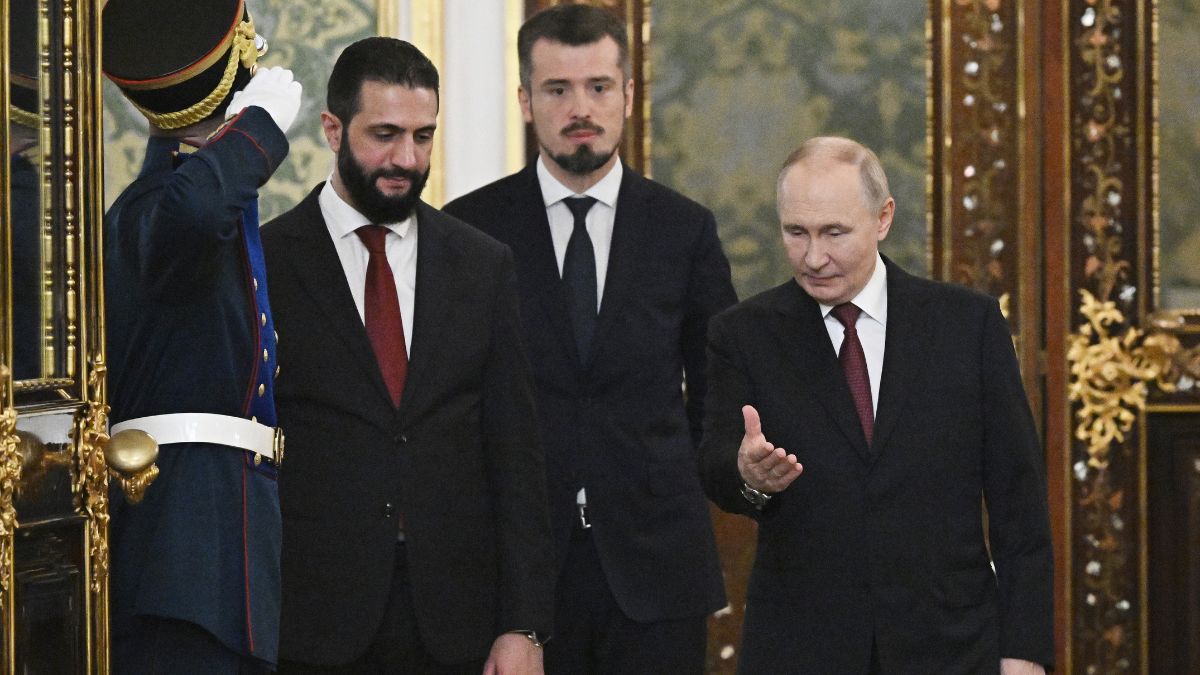What Ahmed Al-Sharaa's meeting with Putin means for Russia's role in Syria
 Russian President Vladimir Putin, left, welcomes Syrian interim President Ahmad al-Sharaa, left, for talks during their meeting at the Grand Kremlin Palace in Moscow, Russia, Wednesday | AP
Russian President Vladimir Putin, left, welcomes Syrian interim President Ahmad al-Sharaa, left, for talks during their meeting at the Grand Kremlin Palace in Moscow, Russia, Wednesday | AP
Syria’s interim President Ahmed Al-Sharaa travelled to Moscow on Wednesday for his first in-person meeting with Russian President Vladimir Putin. The visit marked a remarkable shift in the relationship since Putin had long been a staunch supporter of Al-Sharaa’s predecessor Bashar al-Assad, whose regime was overthrown by rebel forces 10 months ago. Al-Sharaa himself led that rebel campaign, having once commanded the Syrian branch of al-Qaeda under the alias Abu Mohammed al-Jolani.
Despite their turbulent history, the leaders adopted a pragmatic tone during their meeting in the Kremlin. Al-Sharaa expressed Syria’s intention to restore and redefine its relationship with Russia. He spoke of building a partnership that prioritises Syrian independence, territorial unity, and long-term security. Al-Sharaa stated that while Syria seeks to re-establish ties with many nations, its relationship with Moscow remains especially significant.
“We respect all the past agreements and the great history with Russia, and we try to restore the nature of these relations,” Al-Sharaa said at a joint press conference with Putin. “We have close relations with Russia, and a large part of Syria's energy sector depends on Russian expertise,” he added.
These assurances effectively signal that Russia would be permitted to maintain its military presence in Syria. Since 2015, when Russia started playing a key role in propping up the Assad regime, it has invested heavily in military and strategic assets in Syria. That helped Moscow develop facilities like the naval base at Tartus and the airbase at Hmeimim.
Though Russia’s presence has shrunk since Assad’s fall, Moscow still views Syria as vital to its strategic posture in the eastern Mediterranean. Putin welcomed Al-Sharaa warmly, praising the decades of special relations between the two nations and reiterating that Russia always acted in the interests of the Syrian people. He called for deeper cooperation, particularly in the fields of defense trade and reconstruction.
However, Russia’s position in Syria is not what it once was. Most Russian troops have departed, and their remaining operations are tightly restricted. At the Hmeimim and Tartus bases, Russian personnel now require advance clearance from Syria’s internal security forces and can only travel under armed escort. Analysts say Moscow’s use of the Tartus port has been reduced to a single berth, which can only be accessed with Syrian permission. A recent deal between Damascus and Dubai Ports World has further sidelined Russia’s economic role with an $800 million investment pledged to redevelop the Tartus facility.
Public opinion in Syria also remains hostile to Russia. Syrians are still angry with Russia for its support for the erstwhile regime, which prolonged the civil war and led to mass atrocities. Still, Al-Sharaa sees benefits in Russian assistance as Syria struggles with economic woes and political instability.
In return for continued military access, Al-Sharaa is seeking tangible support from Russia. Syrian officials are looking to Moscow for help securing borders, rebuilding infrastructure, and easing the country’s dire economic conditions. Russia has already supplied discounted oil grain and medicine and has pledged to assist in restoring power grids and transport links damaged during the war.
Beneath the surface, cooperation remains a sensitive and unresolved issue. Bashar al-Assad has been living in exile in Moscow since his ouster. Many observers expected Al-Sharaa to formally request Assad’s extradition so he could face charges for war crimes. Yet the issue was absent from official statements. Russia has granted Assad asylum, citing humanitarian grounds. Foreign Minister Sergei Lavrov said the former president and his family had been at risk of assassination and would remain safe in the Russian capital. Sources suggest Assad now divides his time between a secure villa and a luxury apartment in Moscow. Analysts widely believe Russia will reject any extradition request, continuing its pattern of sheltering former allies and fugitives.
Al-Sharaa’s visit to Russia is part of a broader diplomatic strategy aimed at reshaping Syria’s global image. Having risen to power from within an Islamist rebel faction, the new president now seeks to position himself as a moderate nation-builder. Moreover, Al-Sharaa is aware that Syrian unity is still fragile. While the recent parliamentary elections were somewhat successful, not all regions participated in it because of the ongoing instability. The representation of women and minorities was questionable as well. Meanwhile, Syria is facing its worst drought in decades, which has slashed wheat harvests by nearly half and worsened an already dire humanitarian situation. With poverty levels affecting almost 90 percent of the population, economic survival remains a key concern for the new government.
As part of its regional strategy, Russia continues to prioritise access to military facilities in Syria. Aside from Hmeimim and Tartus, Moscow hopes to retain use of a smaller airbase in Qamishli near the Turkish and Iraqi borders. These locations provide Russia with essential logistical links between the Black Sea and Africa through the eastern Mediterranean.
The meeting in Moscow may mark the start of a new chapter in Syrian-Russian relations, one shaped less by ideology and more by mutual necessity. “Relations between Syria and Russia have always been exclusively friendly,” Putin said. “We in Russia have never had any relations with Syria that were tied to our political circumstances or special interests. Throughout these decades, we have always been guided by one thing: the interests of the Syrian people.”
Middle East